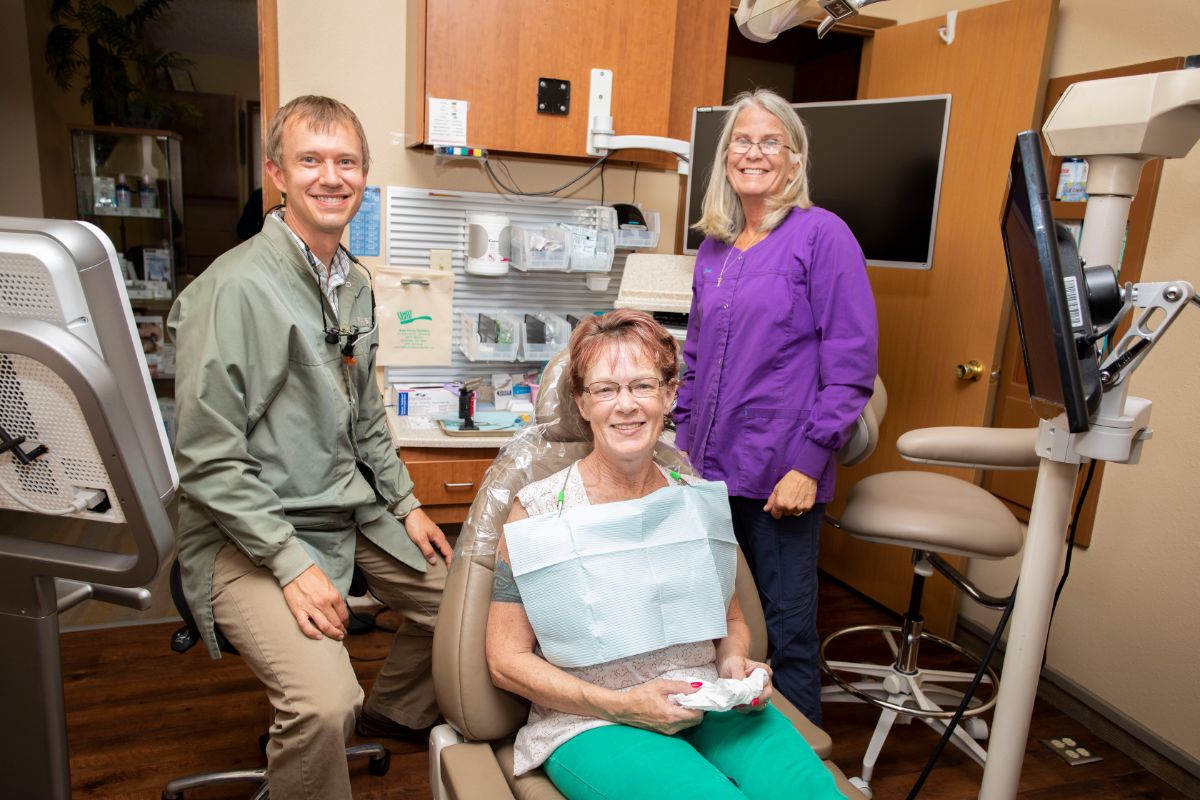Once upon a time, patients who were missing one or more teeth had very limited options to choose from, mainly dentures, partials, or bridges. But modern dental implants have almost fifty years of success behind them, and allow us to offer patients a safe, attractive, and long-lasting way to restore their natural smile. If you’re missing one or more teeth, Cashmere Family Dentistry can help improve the appearance and function of your smile using dental implants. Keep reading below to learn more!
What are dental implants?
Dental implants are usually made from titanium, since this material is naturally accepted by the body, and replace a missing or partially missing tooth. A small, metallic rod is placed directly into the empty socket of the absent tooth. Over time, the jawbone and gum tissue in this area will fuse with the implant, forming an artificial root. When your mouth is fully healed, you’ll return to our office to complete the process.
What is involved with a dental implant procedure?
Dental implant procedures are typically conducted in three separate phases. It can take anywhere from 5-8 months for all three phases to be completed, but the long term success of implants depends on giving the body adequate time to accept the implant before concluding treatment.
Phase One
Once you decide on dental implant treatment, Dr. Busk will refer you to a trusted oral surgeon who can place the implant. The bone structure around the missing tooth will be examined first. In the case of a partially missing tooth, the remaining materials may be removed, or if the bone density is low, bone grafting may occur. If grafting is required, patients will usually need to wait 3-6 months for the area to heal before moving on to the second phase. If bone grafting is not required, Phase Two may be initiated within the same session.
Phase 2
In this stage of treatment, the titanium implant post will be inserted into the jawbone. The procedure generally lasts 1-2 hours and patients will need to allow 3-6 months for the area to heal. Regular check-ups with one of our dentists will be scheduled during this period.
Phase 3
This final phase is known as implant restoration. To conclude your smile transformation, one of our dentists will attach a realistic-looking dental crown or a sturdy fixed bridge to the implant post. We will choose the option that best fits your individual needs. This will not only restore the function of your smile, it will also greatly improve the appearance of your smile – your implants will look and feel just like your natural teeth!
Why replace missing teeth with dental implants?
Sometimes we have patients ask us why they should replace a missing tooth, particularly if it’s not noticeable or causing any immediate problems. But sudden changes in your bite can lead to many other problems, such as crowding, gaps between teeth, or tooth grinding. The other teeth along the same gum line will begin to shift inward to close the gap left behind by the missing tooth, altering the way your top and bottom rows of teeth fit together. Small issues can become bigger problems before you know it, so we recommend replacing a missing or partially missing tooth as soon as possible. Working with our Wenatchee team can prevent you from the time and expense of future reconstructive dental work.
What are the benefits of dental implants?
Unlike other options, a dental implant replaces the entire tooth, including the root. Because it functions like a natural tooth, implants can offer many advantages over other alternatives.
- Durability – Most patients who follow a regular oral hygiene regimen can expect their implants to last a lifetime.
- High rate of success – Dental implants are successful in 95-98% of cases.
- Natural appearance – Dental implants look and feel like a natural tooth, and crowns can be made with all-ceramic materials that closely match the appearance of your natural teeth.
- Improved oral health – Unlike dental bridges, dental implants won’t increase your risk for tooth decay or sensitivity since the implant integrates into your jawbone seamlessly.
- Improved jawbone strength – Because they don’t rely on support from adjacent teeth, dental implants can keep your jawbone strong. No atrophy of the bone will occur, either, since the jawbone is needed to support the implant, no atrophy of the bone occurs.

How long do dental implants last?
Depending on your age, a dental implant has a very good chance of lasting a lifetime. The crown connected to certain implants can last for up to 15 years before needing a replacement. Scheduling a check-up with our Wenatchee office at least twice a year and maintaining an excellent oral hygiene routine will ensure your implant – and your whole smile! – stays strong and healthy throughout the years.
How long is the recovery process with dental implants?
Following dental implant treatment, patients might experience some slight discomfort and pain for up to a week as the area heals. Gauze packs will generally be provided to bite down on, which is essential to controlling the initial bleeding. Applying ice packs will help to reduce any swelling. You may be advised to only consume liquid or pureed food and drink with a straw for the first few days.
 Caring for dental implants
Caring for dental implants
Dental implants must be cared for and maintained just like you would your natural teeth. You should be brushing twice a day and flossing nightly, as well as scheduling regular dental check-ups every 6 months or so. A solid dental routine will help ensure the longevity of your implants. You may want to consider using a special purpose implant brush and interdental brushes to efficiently clean the side of the implant.
Restoring your smile and self-confidence with Wenatchee dental implants
Dental implants are an ideal permanent solution to missing or partially missing teeth. Once the process is complete, they are no different from your other teeth in terms of function and appearance. They also help to keep the bone tissue healthy and strong. With dentures or bridges, the bone tissue can actually degrade over time.
Only patients with relatively good dental health are candidates for dental implants. Viable bone tissue must be present to ensure that the implants will stay rooted. This is one reason why it’s so important to see us for a tooth implant as early as possible if you have a missing tooth or multiple missing teeth. Call today to schedule an appointment at Cashmere Family Dentistry or feel free to drop by for a short tour of our office and introduction to our dentists and team. We would be happy to show you how dental implants can improve your oral health and your overall quality of life!


 Caring for dental implants
Caring for dental implants

